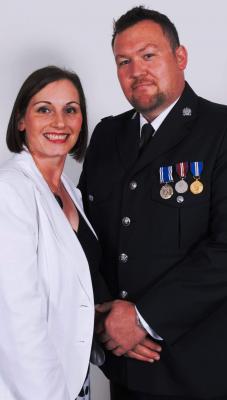Noosa lifesaver Vittoria (Tori) Farmer has been honoured by the Royal National Lifeboat Institution (RNLI) after a brave and challenging rescue in Cornwall in south west England that saved the life of a former police officer.
Tori and fellow RNLI lifeguard Alex Ashen were awarded a Bronze Medal for Gallantry for their “courage, selflessness, determination and surf skills in challenging conditions“ for the rescue of a man caught in a powerful rip on Mawgan Porth Beach. Fellow lifeguard Theresa Morokutti received a framed letter of thanks from the chairman of the RNLI.
It was only the third time in the charity’s 20 year existence that such an accolade had been bestowed.
Jon Marshall, from Yorkshire, was on holiday in Cornwall at the time the rescue took place in the late afternoon of Thursday 17 June 2021 on Mawgan Porth Beach, four miles north of Newquay, Cornwall.
It was about 4pm with an ebbing tide and big surf conditions when RNLI lifeguards Tori and Alex were patrolling the water’s edge.
“It was a pretty standard day at Mawgan Porth. We did have an increasing swell throughout the day, but Mawgan Porth is renowned to be quite rippy at times, so it is nothing out of the blue for strong rip currents to appear. The significance of this rescue was just how quickly the situation escalated; it was like something I have never seen before,“ Tori said.
Alex and Tori noticed a swimmer drifting out into the middle of the breaking waves. They could see he was being hit by large heavy waves and was losing his footing. The swimmer was being dragged further out to sea by the powerful water movement. Describing the moment, he was pulled into the flash rip current Jon said: “I’d just gone down there for no more than a paddle and then suddenly it was like trying to walk up a water flume, it happened that quickly. The current moved into where I was and I immediately knew I was in trouble.“
Alex grabbed his rescue board and began to paddle out towards the casualty. Tori, who had climbed onto the lifeguard truck to get a higher view point, noticed more surfers waving for help. Knowing she had to act quickly she radioed the lifeguard unit to request back up safety cover as she had to leave her position on the shoreline.
By this point, Jon was struggling to keep his head above the water, when he remembered a technique called float to live from his training as a former police officer and the RNLI’s safety messaging. By leaning back in the water, extending his arms and legs and resisting the urge to thrash around, Jon managed to gain control of his breathing and stay afloat whilst the lifeguards made their way towards him. In response to Tori’s call for back-up, lifeguard Theresa drove the Rescue Water Craft (RWC) down to the shoreline in case she was needed to assist them in the water.
Alex and Tori manged to get to Jon, but by now the powerful rip current and large crashing waves had depleted almost all his energy to keep himself above the water. Encouraged by the lifeguards in the relentlessly challenging conditions, Jon managed to get hold of one of the rescue boards.
“Alex and I reassured him saying, ’look Jon, you are in great hands, we are nearly there, you are doing a great job. Just keep holding onto the handles of the (rescue) board’. That is all we could say at that point, he remained in a very calm manner, almost too calm. I think it’s because he fully understood how much danger he was in,“ Tori said.
Due to the sheer power of the conditions they were in, Alex and Tori were unable to get Jon fully onto their rescue boards and surf him back to shore. The rip current was pushing them all further away to deeper water.
“Initially we were about 20-30m from the shore but we were rapidly getting pulled out and before we knew it, we were edging towards the northern corner of the beach, way out of our depth. We were still figuring out how we were going to get him back to the beach. We’d been battling in the powerful vortex with really large swell for at least 20 minutes, the rip was raging. It was definitely the most physically demanding rescue I have ever been involved in,“ Tori said.
“Alex and I definitely had a few moments when we looked at each other. We were alarmed, it was a very difficult situation to be in. But we’d spoken to Jon and we’d exchanged words, we’d reassured him telling him we were going in soon, but we weren’t exactly sure when or how that was going to happen. One thing was for sure; we were never going to give up! We were not going to not bring him back home to his family. That was just not an option for us.“
Seeing the situation unfold from the shore, Theresa knew her fellow lifeguards needed help, so she launched the RWC and headed straight towards the group. The sea conditions meant manoeuvring the RWC alongside the casualty was a difficult and serious challenge. Using her skills and wave sense to judge her timing, Theresa managed to get alongside Jon.
Alex and Tori helped Jon onto the sled at the back of the RWC but he was repeatedly knocked off by breaking waves. By this point Jon was exhausted and completely unable to help himself. Theresa, having to circle around again because of the breaking waves, positioned the RWC alongside Jon once more. Tori and Alex used all their skill and strength to haul Jon up and secure him. This time they succeeded, and Theresa was able to take Jon back to the beach, where he was treated for exhaustion and potential secondary drowning by senior lifeguard Tom Houghton.
“Jon did an amazing job at remaining calm and listening to us, he didn’t fight, he didn’t panic. He preserved his energy, not wasting it on those things and did such a phenomenal job. I think that is one of the main reasons why he is still here today. He did such a great job of listening to our advice, hanging on and fighting for his life,“ Tori said.
“I tried to do everything right but it was completely out of my control,“ Jon said. “As a former police officer of 25 years, I’ve been in all sorts of high stress situations, as every cop has of my service, but this was different. I’ve never felt as small as I was in that water. You’re completely insignificant compared to the size and the power of the waves. The waves were taking me under, I was rolling and getting back up, getting a breath and then my head was back under and that was when I thought ‘this is it.’ When I saw Alex, I had never been so pleased to see anyone in my life.“
Speaking about how she felt in the moment she saw Jon being taken back to shore, Tori said: “It was relief, it was shock, it was adrenaline, so much adrenaline. It was absolute satisfaction and pure happiness as well. There were points in that rescue when I was questioning how I was going to get out of the situation. Alex and I are both surfers and we spend a lot of time in the water in big swell, so we knew we could have gotten ourselves out of there if we absolutely had to. But like I said before, there was no way we were leaving without Jon. Twenty minutes is a very long time in those sorts of conditions in the sea. You’re exhausted but you don’t feel it as your adrenaline is pumping and you are just focused on getting this person to safety. When he got to shore and we followed in behind, it was just this instant weight lifted off my shoulders thinking; ‘right we’ve done our job’. I know this rescue will stick with me for the rest of my life.“
Senior RNLI lifeguard Tom Houghton has been praised for his leadership and trust in his team’s capabilities that allowed him to oversee the situation from the shore.
The lifeguards were informed of the awards by RNLI area lifesaving manager Dickon Berriman, who said: “In recommending these awards, the RNLI Trustees recognise the difficulty of the rescue which took immense skill, determination and fitness. Tori and Alex willingly placed themselves in harm’s way to rescue a stranger. Had they not acted as they did, Jon would almost certainly have drowned. Theresa was absolutely instrumental in securing a safe and successful outcome for Jon and her colleagues, her skill and surf sense and her intuitive actions by launching the RWC to assist saved a life.“










